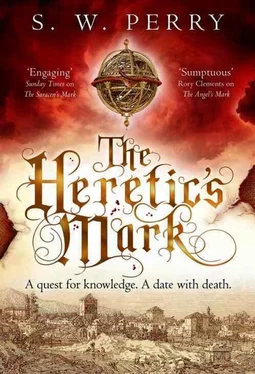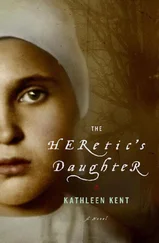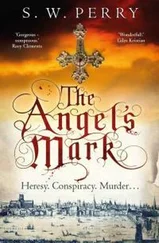In December Bianca’s old family house unexpectedly comes up for rent. They move out of the Borgo dei Argentieri, taking Luca and Alonso with them. Nicholas can afford servants now: there are enough well-heeled foreign students at the Palazzo Bo for an English physician to take on as clients. And thanks to Professors Galileo and Fabrici putting the word about that there is a competent young man of physic new to the city who might be just the fellow to consult for your current troublesome malady, he has Paduan patients, too.
In the new year, Girolamo Fabrici’s revolutionary anatomy theatre opens to great acclaim. Nicholas attends a lecture there. Watching the cadaver being dissected by the great man, he cannot help but think back to the night of the Feast of the Holy Rosary. Wherever she is now, he hopes Hella Maas is at peace. Given the hurt and pain she has both suffered and inflicted, he thinks she will need a little rest – before she faces her Last Judgement.

In the courtyard of her parents’ old house, Bianca writes her will. Made on this, the first day of June, in the year of our Lord 1595, and being possessed in all respects of sound reason and health… She does not plan to die, but when childbirth is imminent one has to take precautions. Nicholas finds it hard not to weep at her bravery.
A little before sunrise on the fifth day of the month, with a soft wash of light gilding the domes of the Basilica of St Anthony, Nicholas and Galileo wait outside the lying-in chamber in the house where Simon Merton and his wife, Maria Caporetti, once lived. Nicholas has spent several hours in a state of unrest. But not once has Eleanor called to him through the haze of anxiety in his head. And whenever his thoughts have wandered briefly in her direction, she has somehow never quite materialized into any identifiable form.
When he hears the laughter of the midwives, followed almost immediately by a robust, high-pitched howling, he finds it almost impossible not to weep.
‘That’s a lusty boy, or Galileo Galilei can’t count,’ his friend says, clapping him on the shoulder. ‘By what name will he be christened?’
‘Bianca wants to name him Bruno. That’s good enough for me.’
The mathematician purses his lips in approval. ‘You should thank the saints for your good fortune. If you need any help spending the money you’ve saved on a dowry, I’ll be your man.’
Nicholas would laugh – were it not for the fact that he is too busy giving thanks that curses have power only over those who believe themselves cursed.

A cold wind is blowing off the River Thames, stirring the leaves on the trees in St Saviour’s churchyard. Towering over his wife, Ned Monkton draws her to him, placing himself between her and the small wooden cross. They have been coming here every week after Sunday sermon since early April. Ned holds her until he feels her sobbing ease a little.
‘We wasn’t cursed, Rose. It was God’s will,’ he says softly. ‘We cannot know what is in His holy plan. Perhaps He has more need of her than we do.’
‘But couldn’t He ’ave given her a minute or two of life?’ Rose asks, red-eyed. ‘Enough for us to bid her welcome, and tell her she was loved?’
‘There will be another child, Wife,’ Ned says gently. ‘An’ more than just another.’
He tries hard to sound as though he believes it. Having spent so many years amongst the dead, he has often thought he would be inured to the pain of loss. But the murder of his young brother, Jacob, five years ago had shown him that familiarity is no protection. He holds Rose even closer, to draw some of her own strength into him, then releases her because he knows she needs it even more than he does.
‘We must pray that will be so,’ she says, stepping back and wiping her eyes on her sleeve. ‘And I know I should not be angry with God. More than once I pleaded with him to spare you , even at the cost of our unborn child. Was that wrong of me, Ned?’
‘Nay, Wife. I would ’ave made the same bargain, had it been you on your way to Tyburn.’
Rose takes his hand in hers. The weight of it surprises her, as it always does. She marvels at how something so hard and powerful can caress her so gently. Yes, she thinks, surely there will be others.
Lifting his branded thumb towards her mouth, she bestows a kiss upon the recently healed scar tissue, sensing the puckered M against her lips. Then she lets it fall.
‘Come, Ned Monkton,’ she says, trying to smile through her tears. ‘We cannot tarry here amongst ghosts. We ’ave a tavern to run.’
The extraordinary triptych The Last Judgement , painted by Hieronymus Bosch, went missing from his home town and was only catalogued, some sixty-five years after this story is set, when it appeared in the private collection of the Archduke of Austria. It is now on public display in Vienna. A congregation in the sixteenth century must have found its phantasmagorical images – intriguing and compelling even today – terrifying.
Pilgrims have been walking the Via Francigena to Rome for more than a thousand years. Archbishop Sigeric made the journey from Canterbury around eighty years before the Battle of Hastings. The story of his journey is told in a splendid audiovisual presentation in the Entry Point Museum in the beautiful Italian town of Lucca.
Girolamo Fabrici – or, to give him his Latinized name, Fabricius ab Acquapendente (I have used his Italian name throughout for ease) – held the chair of anatomy and surgery at Padua for fifty years. He is responsible for the construction of Europe’s first custom-built anatomical theatre, which can still be visited today at the Palazzo Bo. Dissections were performed there until the last quarter of the nineteenth century.
It was only about fifty years earlier than that when Ned Monkton’s ruse to escape the gallows was removed from English law. The actor and playwright Ben Johnson relied upon Benefit of Clergy to avoid being hanged for the manslaughter of a fellow actor, though he didn’t need his wife to coach him in his lines.
In 1597 Galileo Galilei, professor of mathematics at Padua, perfected his military compass. It was a bestseller. It enabled him, amongst other things, to pay back the two hundred ducats he had borrowed to settle the issue of his sister’s dowry. His subsequent career needs no further exposition here.
Which brings us, finally, to Antonio Santucci’s great armillary sphere. At 3.7 metres high – more than twelve feet – it towers over the modern-day visitor to the Museo Galileo in Florence. It looks, at first glance, like something from the set of an episode of Dr Who . What a sixteenth-century Florentine must have made of it, we must leave to the mists of history.
Once again, my deepest gratitude to Susannah Hamilton, Sarah Hodgson and everyone at Corvus Books for their hard work and encouragement, and to my agent, Jane Judd. If there was ever to be a medal for saving authors from their own howlers, one must surely go to copy-editor Mandy Greenfield, whose eagle eye and uncanny memory have once again avoided far too many embarrassments on my part.
Also due my sincere thanks are Penny and Brian Osborne, Annie and Pete Williams, Di and John Richardson, Lisa and Chris Seabourne, Sue Stirling, Gill Stringer, Naomi and Darren Standing, Mike and Sian Simpson. I must thank, too, the Chapman family: Rachel, Jeremy, Joseph and Sian; Val and John Holloway, and all those book-club members around the Worcestershire Lenches who have been generous enough to support my writing and have enjoyed and championed the Jackdaw series.
Читать дальше













